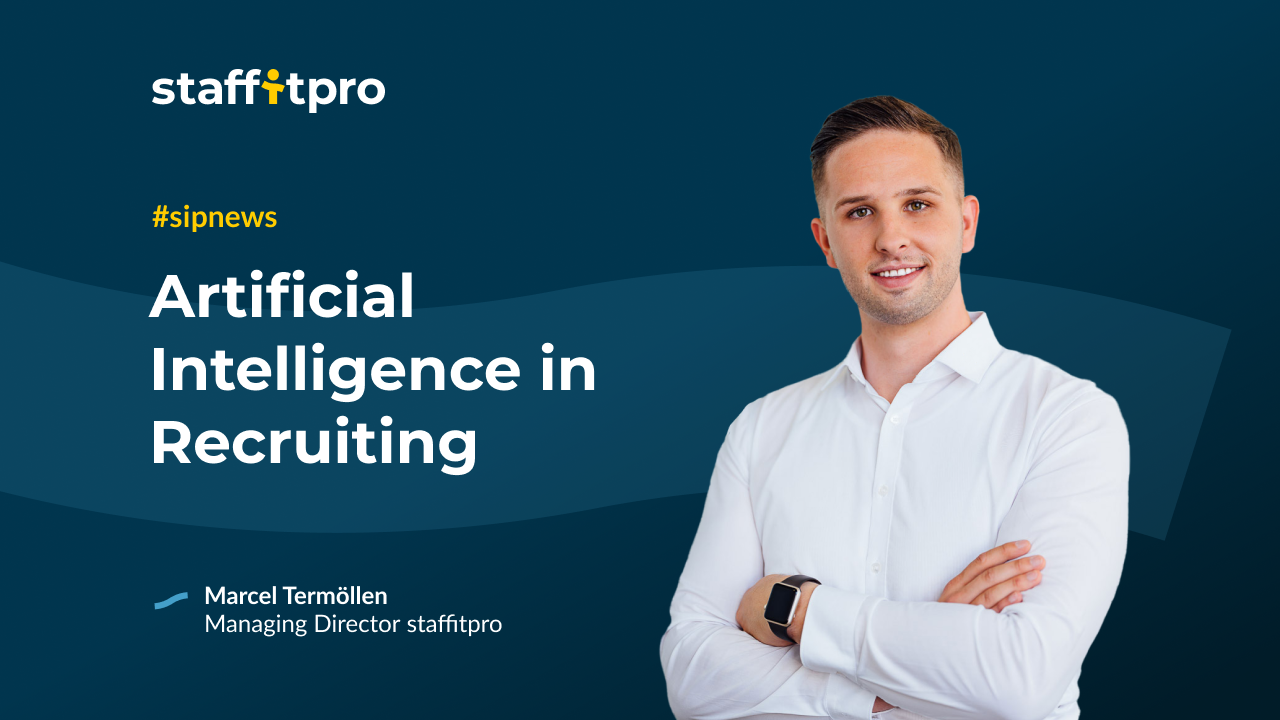Artificial intelligence is an opportunity
What does artificial intelligence actually mean, and which tasks in personnel recruitment can it be used to solve?

What does artificial intelligence actually mean, which tasks in personnel recruitment can be solved with it, and will an entire profession soon be in danger? Marcel Termöllen, AI specialist and commercial director at audeoSoft, provides answers in this interview
Marcel, you are very intensively involved with artificial intelligence. What is your definition of AI?
Artificial intelligence aims to imitate human thoughts and human actions and, as a consequence, to react independently to problems – and then to solve them. Looking to the future, I also think that there will be different AI; similar to how there are different people who have all learned something in one way or another.
In what contexts does AI currently already exist?
One should always be careful about what one specifically understands by AI, because the answers vary accordingly. If you go with the definition that comes from a cinema context, this kind of AI does not yet exist in the real world – for example, very human behaviors of robots like in the movie "I, Robot." However, there are already many AI-based programs that are capable of performing comparatively simple functions. These include, for example, capturing the content of texts or recognizing people's emotions on the basis of their speech. This hardly has anything to do with pure automation but already ranks one level higher.
When do you think the switch from automation to AI will take place?
From a purely implementation perspective, we as a software company are far ahead of the competition in our industry. We could actually deliver the technology within a year. At the moment, however, we still find ourselves in the age of automation, and I believe this will continue for another two to three years. Only then will the acceptance of AI in our industry have increased to such an extent that new types of solutions can be implemented. So far, the transformation is still delayed, mainly because of a lack of acceptance in the industry.
I'm sure you've heard about Facebook chatbots Alice and Bob, who have developed their own language: Realistic, scary or pure scaremongering?
In this case, I would say it was certainly scaremongering in the first place. However, it's not necessarily possible to say for sure that other examples don't pose a risk either. This area has simply not yet been researched in sufficient detail. In this context, the following thought experiment comes to mind: What happens when the bot – that is, the AI – realizes that it can only be as good as the human who programs the system? That the system falls short of its capabilities? From this, the wildest scenarios develop, up to the extinction of mankind. I think this are also mainly systematic scare tactics. In my opinion, there are much more important things to talk about in this area. Horror scenarios of this kind usually arise especially from ignorance and fear of the unknown.
So, looking ahead over the next 15 years, you wouldn't classify AI as a threat to humans?
Quite clearly: no. I take a very relaxed view of AI. A good example for me is the invention and establishment of the steam engine. At that time, the great fear of a majority of people was that they would be replaced and subsequently never find work again. In fact, however, a whole host of new professions and employment opportunities have emerged for people. This will be the case again in the future.
So, AI is also an opportunity for the recruiting industry?
Absolutely! Our approach to the topic definitely contributes a great deal to this. Because we use AI primarily to save recruiters time-consuming manual processes. This leaves more capacity for strategically important tasks. However, there are indeed other systems that pose more of a risk. I am thinking of the business networks LinkedIn and Xing. The enormous power based on the large amount of data collected alone would have the potential to make the job of recruiter redundant. A company looking for skilled workers would then, in theory, only have to request a specific portfolio from the company – and the company would be able to present the right person based on the stored data. Of course, there is a great danger in this, and we often explain this to our customers in our discussions. If these companies were to provide such software themselves and were to use it, even more data would be collected. This, in turn, could have negative consequences for the recruiting industry.
So, AI opens up many possibilities – but you still don't expect it to replace the job of recruiters one day?
No, I don't expect that. It is possible that there will be fewer recruiters in the future. However, I am convinced that there will always be a kind of "luxury recruiting" that will be used in the search for particularly sought-after specialists. And in this context, the action of a human force will become an exclusive feature. So, I am very confident that the profession of recruiter is always here to stay.
Across industries, what other roles should AI take on in the future?
Basically, the acceptance of AI will increase as touch points are scaling up. This can be compared to the digital natives – they also use smartphones and the like as a matter of routine, while the previous generations more or less slowly approached the topics. Personally, I'm not in favor of AI being used in every industry and then for as many tasks as possible, but only where it can offer people added value. And then there are areas where personal interaction should continue to be the focus in the future, such as care for the elderly and the sick. In my view, AI has no meaningful application in the interaction between staff and clientele.
+49 611 262486 40
sales@staffitpro.com
Mo.-Fr. 08:30 - 17:30 Uhr
+49 611 262486 80
support@staffitpro.com
Mo.-Fr. 08:30 - 17:30 Uhr


